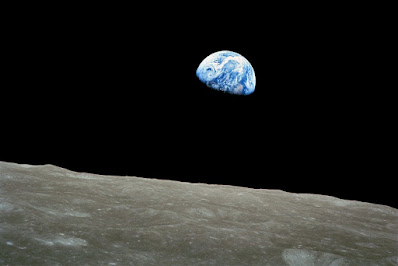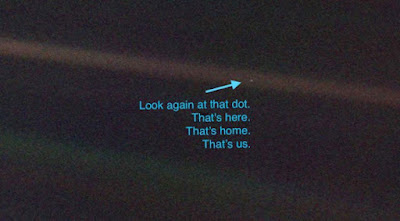 |
| Earthrise, a photograph taken from lunar orbit by the Apollo 8 astronaut William Anders, on December 24, 1968. At the time, this pic was thought to have shown people the limits of growth. Then everyone forgot. |
As you may know, Thee Optimist is a believer in that mysterious medieval practice known as "science."
He is not necessarily a cheerleader of science.
In fact, he thinks most living things on the Earth (and maybe even people) would have been better off if we had all remained mired in religion, for the most part living brutish lives exposed to the elements and abruptly cut short after ingesting untreated waste water.
Or you know, being grotesquely tortured and executed for not following the dominant religion properly.
That would have kept our numbers down.
In any event, that didn't happen, so science is what we have, to put it mildly. And there are many things we can learn from it, if we choose.
One such thing is the concept of a paradigm.
In science, a paradigm is a framework through which to observe reality. It can be a set of concepts, thought patterns, theories, models and research methods that govern the pursuit of new knowledge.
Basically, it is a set of preconceived notions. And they can color the perceptions of the people who live within them. Indeed, they can blind people to other possibilities to such an extent, that they become reality.
A famous example of this is when in 1900, Lord Kelvin is thought to have said, "There is nothing new to be discovered in physics now."
Five years later, Albert Einstein published his Theory of Special Relativity, which challenged the notions of Newtonian Physics that had dominated science for 200 years.
Kelvin was wrong. And when you're wrong about something, and you discover new information, you can then undergo a "paradigm shift" to a new reality.
What are we wrong about?
 |
| "Houston, we have a problem." |
The Limits to Growth
Since the collapse of the Soviet Union a little over 30 years ago, we have lived on a planet completely dominated by the tenets of capitalism.
Many people confuse this issue, so let's clarify: capitalism is not democracy. Capitalism is an economic system. Democracy is a political system.
You can have one without the other. China has become a capitalist society in recent decades. It is not a democracy in any meaningful sense.
We'll leave the question of whether the United States is a democracy for another time.
In a nutshell, capitalism puts the means of production in private hands. And those private hands seek to increase profits, by any means available, fair or foul.
For a corporation or other capitalist entity to be considered healthy, it must increase profits - in most cases, to do that it must increase revenue. Overall, for a capitalist economy to be considered healthy, it must always be growing.
In capitalism, the focus is always on increasing - increasing the number of products manufactured and sold, increasing revenue from those products, increasing the amount of profit squeezed out of each product.
Capitalism must have growth.
When growth stops, an economy becomes "stagnant." When growth reverses itself, an economy enters a "recession." If the recession becomes deep enough, or goes on long enough, the economy enters a "depression."
These are bad words, not just for capitalists at the top of the pyramid scheme. They're bad for everybody involved. Regular working people lose their jobs and homes. Small-time stock market plungers lose their savings.
We'll set aside everything else that's wrong with capitalism - the cozy relationships between capitalists and government, the unfair monopolies, the regulatory capture, the endless greed of the people at the top, the often unspeakable living conditions of the exploited people at the bottom.
Yeah, that stuff is bad. But humans are generally bad to one another. It's one of our less endearing qualities.
On a planetary scale, the main problem with capitalism is the insistence on growth.
What's the matter with growth, you say?
 |
| July 19, 2013 photo taken by the NASA Cassini spacecraft in orbit around the planet Saturn. In the foreground are Saturn and its rings. Far in the distance, 900 million miles away, is the tiny blue dot known as Earth. |
We Live on a Small Planet
This means that the amount of matter on Earth remains constant over time. Nothing is added, and nothing is removed.
Matter can be changed in form, as when iron ore is mined from the ground and turned into steel, or when trees are cut down to make wood and paper. But the overall amount of matter stays the same.
This, in turn, means the Earth has limited resources. There is a point when they run out.
In the course of human history, everything that has ever been made, sold or consumed has come from the Earth. There is nowhere else it can possibly come from.
Now, there are fantastic schemes proposed (usually by capitalist billionaires and their paid flunkies) that we can go to the moon or other planets and mine the resources of these places to bring back to Earth.
The odds don't look good. In 60 years of space exploration, no one - no country, no company, no conglomeration of countries and companies - has done anything remotely like this, or even come close.
In all likelihood, we are stuck with the resources available here on this planet, which are finite and will not last.
And yet, the constant mantra, under capitalism, is for growth. We want more of everything - more and better cars, more food for the world's growing population, more and bigger homes for wealthy Westerners to live in, more games, more movies, more TV channels, more nifty high-tech gizmos.
We want more. We need more.
And that includes more people. In the year 1800, there were roughly 1 billion people on Earth. It took from the dawn of time to 1800 for that many people to accumulate. In the roughly 200 years since, we've added another 7 billion.
If you chart that on a graph, it looks like this:
 |
| If this was revenue growth, a capitalist would love it. It is the "J curve" or "hockey stick" that every money monger wants to see. And as a general rule, more people does lead to more revenue. |
The two states are incompatible. You can't have unending growth in an environment that is limited.
Cancer cells attempt to do this, and eventually they kill their host. Viruses do the same thing.
What we need to do is shift our perspective, and think about a different approach to economics and to human civilization.
Happily, smart people have already done some thinking along these lines. Unhappily, the rest of us mental midgets haven't seen fit to absorb this thinking.
But we can start. Here are a few concepts to chew on:
Words of Wisdom
"If you can imagine yourself in a darkened room with only one clearly visible object, a small blue-green sphere about the size of a Christmas-tree ornament, then you can begin to grasp what the Earth looks like from space. Let me assure you that, rather than a massive giant, it should be thought of as the fragile Christmas-tree ball which we should handle with considerable care."
- William Anders, Apollo 8 astronaut


No comments:
Post a Comment